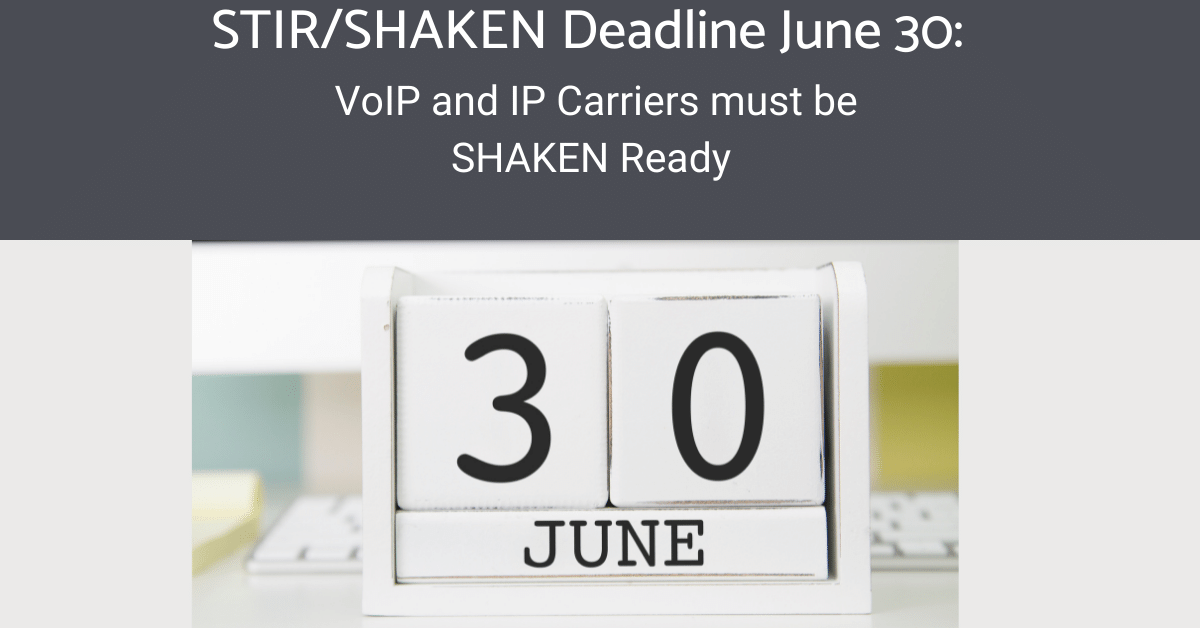VoIP/IP Networks SHAKEN deadline is quickly approaching
The Federal Communications Commission issued an order on December 10, 2021, that impacted all non-facilities-based carriers plus some small voice service providers (SVSPs). The order moved the June 30, 2023, STIR/SHAKEN compliance deadline to June 30, 2022, for all VoIP/IP networks.
Why was the STIR/SHAKEN compliance deadline moved up?
The FCC is working to eradicate illegal robocalls and the STIR/SHAKEN implementation is a critical piece of the puzzle. The FCC knows that scammers and fraudsters utilize some non-facilities-based carriers and SVSPs to place their illegal calls. However, without STIR/SHAKEN, it is difficult to identify and track them down. The STIR/SHAKEN program only works when all carriers are compliant. However, the FCC had to wait for technology/ecosystem to catch up, and now by this action, it has determined any VoIP network can easily become STIR/SHAKEN compliant. In short, the FCC ordered SHAKEN compliance of all VoIP networks by June 30, 2022. Additionally, this authorizes SHAKEN carriers to block non-tokenized traffic originating from VoIP networks.

What is a Non-Facilities-Based Small Carrier?
Non-Facilities-Based small carriers are carriers that do not own or operate transmission facilities. Think of them as VoIP based carriers. The original FCC STIR/SHAKEN deadline gave these carriers a 2-year extension, until June 30, 2023, to obtain the “token” necessary for implementation.
What is a Small Voice Service Provider (SVSP)?
A small voice service provider (SVSP) is any LEC carrier that has 100,000 or fewer voice service subscriber lines. For example, think of the small, independent local telco in Central Nebraska with a total of 7,500 subscriber lines.
What SVSPs are impacted by the truncated STIR/SHAKEN compliance deadline?
Any SVSP that is responsible for generating a high volume of illegal robocalls compared to facilities-based and larger providers must have STIR/SHAKEN implemented by June 30, 2022. Further, the FCC has directed its Enforcement Bureau to provide written notice to SVSPs suspected of being a source of illegal robocalls.
What does this mean for you (and your legitimate operation)?
Worst case, your carrier is not SHAKEN ready. This means potential blocking of your calls, or calls not signed with Full Attestation.
To ensure there is no negative impact for your call center or sales team, we recommend doing a SHAKEN test. It is simple. We will give you 4 numbers to call from your dialer or phone system. Then, we will determine if or how your calls are digitally signed and with what level of Attestation (indicating that your carrier signs your calls and delivers them over a SHAKEN call route).
Do you have questions? Schedule a no-obligation consultation today:
Want to learn more about STIR/SHAKEN compliance?
Full STIR/SHAKEN implementation is very important because legitimate callers need to get their calls delivered to and answered by the called party. Right now, most carriers are blocking calls if the all is not signed with a SHAKEN token by the originating carrier. American businesses and non-profits have a legitimate need to contact prospects, customers and other stakeholders to ensure timely relevant communication but they may be unaware that their calls are being blocked.
Learn more about STIR/SHAKEN compliance and STIR/SHAKEN compliance deadlines in this related post: STIR/SHAKEN Implementation: Are your calls getting delivered?
Angela Garfinkel, Director at Quality Voice and Data, brings over 30 years of experience in call center and business process outsourcing. Well known in the telemarketing and telecommunications industry, she co-authored a course for The Direct Marketing Association and actively participates in professional groups like PACE. Her educational background includes an MBA and an undergraduate degree in Telecommunications Management from the University of Nebraska.
